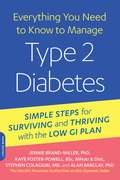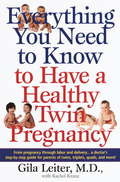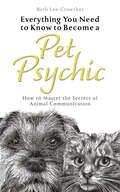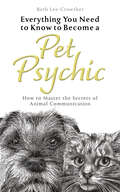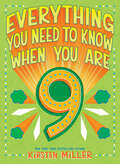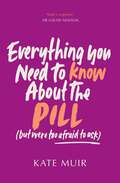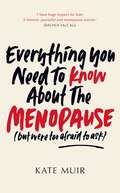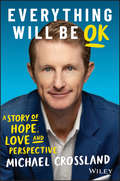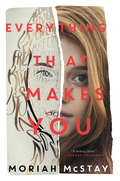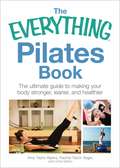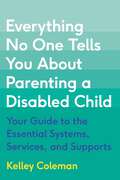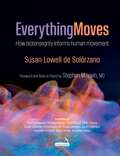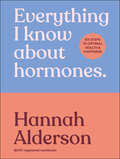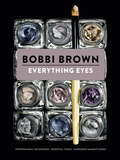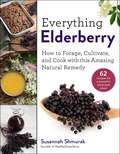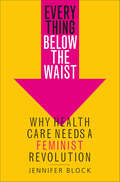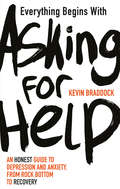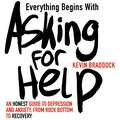- Table View
- List View
Everything You Wanted to Know about the Afterlife but Were Afraid to Ask
by Hollister RandFrom the world class spiritual medium and author of the &“compassionate yet educational&” (John Edward, author of Infinite Quest) I&’m Not Dead, I&’m Different comes an insightful exploration into what it&’s like on the other side. Is there really an afterlife? Do spirits still feel love for us? What is it like when we cross over? After more than twenty-five years of bringing comfort to tens of thousands of people, Hollister Rand brings her incredible knowledge and experience to this accessible and comprehensive book that takes you on an eye-opening journey into the afterlife. With warm-hearted sincerity, Rand offers you a clear-eyed and uplifting view into an unknown universe and teaches you how to navigate your life on this earthly plane with eternity in mind. In an increasingly uncertain world, there is only one guarantee: we all face the same outcome. Featuring her signature humor and infused with authenticity regarding her own spiritual journey, Rand provides comfort, clarity, and laughs along the way.
Everything You Need to Know to Manage Type 2 Diabetes: Simple Steps for Surviving and Thriving with the Low GI Plan
by Kaye Foster-Powell Jennie Brand-Miller Stephen Colagiuri Alan BarclayA practical, easy-to-use guide to help you manage type 2 diabetes or prediabetes If you are one of the millions of people living with diabetes or prediabetes, you may feel like you're inundated with information on how to manage your condition. The good news is that we now know a lot more about managing diabetes or reducing your risk of developing it--and here, the world's foremost glycemic index experts share their wisdom. Rather than blind you with science or swamp you with facts, Everything You Need to Know to Manage Type 2 Diabetes sets out clearly and simply what you need to eat and do to help you: Reduce your risk of developing diabetes Improve your insulin sensitivity and your cardiovascular health Keep your blood glucose levels, blood pressure, and blood fats under control Reduce your body fat and maintain a healthy body With tips and strategies for working with your doctor, the most recent info on medications, and guidance on the best foods to eat (at home or at a restaurant), Everything You Need to Know to Manage Type 2 Diabetes offers uncomplicated, straightforward advice to help you survive--and thrive.
Everything You Need to Know to Have a Healthy Twin Pregnancy
by Rachel Kranz Gila LeiterTwins...triplets...quads...finally! The book that answers all your questions about multiple birth--written by a doctor who is a mother of twins herselfOver ten years ago when Dr. Gila Leiter, herself an OB/GYN,was pregnant with twins, the book she desperately needed wasn'tavailable. Now it is: Everything You Need to Know to Have a Healthy Twin Pregnancy. Taking you step-by-step through the processes of pregnancy and birth, Dr. Leiter shares her professional and personal expertise, providing answers to all your questions, plus practical know-how, psychological support, and extensive resources for this most joyous--and overwhelming--experience, whether you're having two babies...or four! Learn:The latest in fertility treatments and reproductive technology,and the probable outcomeWhat to expect, trimester by trimesterConcrete suggestions for working through your hopes, fears, and fantasiesWho should seek genetic counselingHow to avoid preterm labor and premature delivery--and what to do if it's unavoidableRecommended vitamins and minerals--plus do's and don'tsAll about medications: what you can take, can't take, must takeWhat you should know if you're going to have a C-sectionSpecific ideas for nurturing yourself and reducing stressThe birthing process and what to expect in the delivery roomTwelve questions to ask the doctor you're considering choosing for your pediatricianWhat it's like to bring babies home--and what you'll needto manage your new familyAnd much more
Everything You Need to Know to Become a Pet Psychic: How to Master the Secrets of Animal Communication
by Beth Lee-CrowtherAs seen on ITV's This Morning'You really can learn to talk to your pet' - Daily MailWe all want what's best for our pets, but what if we simply don't understand what that is?With this easy introductory guide to animal communication, you can leave out the guesswork and open yourself to a deeper, richer relationship with your pet.In this book, you will: • Learn exactly what animal communication is, how it differs from being a pet psychic and the different types of ways you can psychically communicate with your pet, including Beth's unique PACT method • Receive important messages from your pet, learn to communicate with other people's pets, as well as read messages via photographs • Understand how to solve behavioural issues in your pet and help them with their wellbeing • Be able to learn how to use animal communication to help cope with the loss of a beloved pet as well as learn how to use your new skills to locate a missing animal.Your pet is part of your family, they know what you are feeling, and now you can really understand what they are feeling too.
Everything You Need to Know to Become a Pet Psychic: How to Master the Secrets of Animal Communication
by Beth Lee-CrowtherAs seen on ITV's This Morning'You really can learn to talk to your pet' - Daily MailWe all want what's best for our pets, but what if we simply don't understand what that is?With this easy introductory guide to animal communication, you can leave out the guesswork and open yourself to a deeper, richer relationship with your pet.In this book, you will: • Learn exactly what animal communication is, how it differs from being a pet psychic and the different types of ways you can psychically communicate with your pet, including Beth's unique PACT method • Receive important messages from your pet, learn to communicate with other people's pets, as well as read messages via photographs • Understand how to solve behavioural issues in your pet and help them with their wellbeing • Be able to learn how to use animal communication to help cope with the loss of a beloved pet as well as learn how to use your new skills to locate a missing animal.Your pet is part of your family, they know what you are feeling, and now you can really understand what they are feeling too.
Everything You Need to Know to Become a Pet Psychic: How to Master the Secrets of Animal Communication
by Beth Lee-CrowtherAs seen on ITV's This Morning'You really can learn to talk to your pet' - Daily MailWe all want what's best for our pets, but what if we simply don't understand what that is?With this easy introductory guide to animal communication, you can leave out the guesswork and open yourself to a deeper, richer relationship with your pet.In this book, you will: • Learn exactly what animal communication is, how it differs from being a pet psychic and the different types of ways you can psychically communicate with your pet, including Beth's unique PACT method • Receive important messages from your pet, learn to communicate with other people's pets, as well as read messages via photographs • Understand how to solve behavioural issues in your pet and help them with their wellbeing • Be able to learn how to use animal communication to help cope with the loss of a beloved pet as well as learn how to use your new skills to locate a missing animal.Your pet is part of your family, they know what you are feeling, and now you can really understand what they are feeling too.
Everything You Need to Know When You Are 9 (Everything You Need To Know Ser.)
by Kirsten MillerConquer age nine with the earth-shattering secrets and must-know tips they won’t teach you in school—from the New York Times-bestselling author.Nine is an awesome age. One of the best! You finally start to get the respect you deserve, but you still get to enjoy being a kid. Before kids are ready for more independence, there’s a lot they need to know. This handbook brings together the hilarious (How to Disguise Your Appearance), the helpful (How to Keep Your Head Bug-Free) and the potentially lifesaving (How to Save Someone Who’s Choking) to help kids enjoy every second of year number nine! “These books are the best. Every kid should have them.” —Jason Segel, actor and coauthor of the Nightmares! series
Everything You Need to Know About the Pill (but were too afraid to ask)
by Kate MuirAn eye-opening, no-holds-barred guide to contraception, written by campaigner, journalist and documentary-maker Kate MuirEverything You Need to Know About the Pill (but were too afraid to ask) is the thinking-woman&’s guide to contraception, bringing you answers to all those questions that have been hidden behind a veneer of misplaced shame, bad science and centuries of patriarchy. What's happening to my body - and my mind? Which method of contraception is best for me? Do I really need to take a pill break every three weeks? What about men - where's their pill?! Muir draws on interviews with the leading medical experts in the field, interlaced with her own tumultuous journey with different types of contraception and the personal stories of women from all walks of life, sharing their varied experiences and hard-earned wisdom. Muir also questions why the current medical establishment is getting contraception so wrong, as she debunks the myths and exposes the sloppy science and hysterical headlines that have had a negative impact on women&’s health for the last twenty years. This ground-breaking guide is a social, cultural and scientific exploration into a criminally overlooked and under-discussed part of women's lives. It is a manifesto for change, calling for equality in healthcare and an entirely new - and long overdue - approach to women&’s health. _________________ *Praise for Everything You Need to Know About the Menopause (But Were Too Afraid to Ask):* &‘I have huge respect for Kate. A forensic journalist and menopause warrior&’ - Davina McCall &‘The research Kate has done is phenomenal and so impressive. Everyone needs a copy of this book on their bookshelves!&’ - Dr Louise Newson
Everything You Need to Know About the Menopause (but were too afraid to ask)
by Kate MuirAn eye-opening, no-holds-barred guide to the perimenopause and menopause written by campaigner, journalist and documentary-maker Kate Muir. Everything You Need to Know About the Menopause (and were too afraid to ask) is the thinking woman&’s guide to the menopause, bringing you answers to all those questions that have been hidden behind a veneer of misplaced shame, bad science and centuries of patriarchy. · What&’s the perimenopause and when will it strike? (It&’s sooner than you think)· What&’s happening to my body – and my mind?· Why can&’t I stop thinking about sex in perimenopause?· How do I get my sex drive back after menopause? · How do I look after my body and brain when my hormones disappear?Muir draws on interviews with the leading medical experts in the field, interlaced with her own tumultuous journey through the menopause and the personal stories of women from all walks of life, sharing their varied experiences and hard-earned wisdom.Muir also questions why the current medical establishment is getting the menopause so wrong, as she debunks the myths that surround hormone replacement therapy and exposes the sloppy science and hysterical headlines that have had a negative impact on women&’s health for the last twenty years.It&’s essential that we understand the biology of our own bodies during this critical period that will define the latter half of our lives. With the help of a panel of doctors, scientists and health experts, Muir unpacks the science behind hormones and ageing, and takes a close look at the different options available for treating both body and mind during the profound changes that take us into midlife and beyond.What she discovers is that both symptoms and treatment are far more extensive and diverse than we might expect. The menopause is the whole package, and the treatment needs to be too, with impacts as wide ranging as preventing Alzheimer&’s, boosting sex drive and protecting mental health. This ground-breaking guide is a social, cultural and scientific exploration into a criminally overlooked and under-discussed phenomenon that will affect one billion of us by 2025. And it is a manifesto for change, calling for equality in healthcare and an entirely new approach to women&’s health.
Everything You Need to Know About Wicca
by Geraldine GiordanoAn introduction to Wiccan beliefs, holidays, traditions, rituals, tools of the trade, and more. Geared toward teens.
Everything You Need to Know About Cerebral Palsy
by Dion PincusFacts, treatment, resourcies and stories about this physical disability for older elemantary school readers through adult.
Everything You Need to Know About Acne (Need to Know Library)
by Jennifer CeaserDescribes the different types of acne, their causes, treatment, and prevention.
Everything Will Be OK: A Story of Hope, Love and Perspective
by Michael Crossland'Michael can silence a crowd with his story of triumph over adversity. If you need a dash of hope or inspiration in your life right now, start reading.' Catriona Rowntree, bestselling author and host of Getaway MICHAEL CROSSLAND IS A SURVIVOR Everything Will Be OK is the awe-inspiring story of Michael's journey from enduring life-threatening cancer as a child, to representing Australia playing baseball in the USA, to becoming an accomplished businessman and a globally in-demand inspirational speaker, starting an orphanage in Haiti and taking national ambassador roles with many organisations including Camp Quality. When Michael was initially diagnosed as a child, his chances of survival were practically zero and by his second birthday doctors had reluctantly given up hope. Then one day he was offered one remote chance to fight back—placement in an experimental drug program. Against all odds, he survived. He was the only program participant to do so. But he didn't make it through unscathed. To this day he lives with permanent scars—a severely burnt lung, damaged heart, and an intensely sensitive immune system. In this stirring memoir, Michael shares his story of hardship and challenges that many of us wouldn't even dream of facing, and reveals how a steadfast mindset, genuine compassion, tireless drive, and unwavering optimism helped him to overcome even the strongest obstacles. It is a simple and enduring belief that everything will be OK.
Everything That Makes You
by Moriah McstayEver wonder "What if?" Everything That Makes You is a romantic, epic story about one girl--and her two possible lives after an accident changes her fate.Fiona Doyle's face was horribly scarred as a child. She writes about her frustrations and dreams in notebooks, penning song lyrics. But she'd never be brave enough to sing those songs in public. Fi Doyle never had an accident. She's the best lacrosse player in the state and can't be distracted by her friend who wants to be more than that. But then her luck on the field goes south.Alternating chapters between Fiona and Fi tell two stories about the same girl--hopes and dreams and crushes, fears and failures and loss. This beautifully written realistic contemporary novel with a twist is perfect for fans of If I Stay by Gayle Forman and Before I Fall by Lauren Oliver.d so compelling. In her daring debut novel, Moriah McStay gives us the opportunity to see what might have happened if things were different. Luck may determine our paths, but maybe it's who we are that determines our luck.
Everything Pilates: The Ultimate Guide to Making Your Body Stronger, Leaner, and Healthier (The Everything Books)
by Amy Taylor AlpersExplore the fitness craze that's right for everyone!Whether you're a ballerina or a couch potato, a mountain biker or a fitness novice, you can do Pilates - and reap its amazing benefits. Perfect for building stronger, leaner, more flexible muscles, relieving stress, and achieving full body health, the Pilates method is a revolutionary program that has the power to transform lives.Written by the founders of the internationally renowned studio, The Pilates Center, The Everything Pilates Book gives you all you need to start doing Pilates in your own home - and choose a studio that's right for you. The book provides step-by-step instruction on how to do such incredible exercises as the Spine Stretch, the Roll-Up, and the Swan, as well as more than 100 clear photographs that make it easy to get started.The Everything Pilates Book helps you:Create a supple, powerful bodyPrevent osteoporosisReduce the risk of injuryEstablish proper postureIncrease strength and flexibilityTone absAlleviate back painNo matter of your physical condition, The Everything Pilates Book can help you take control of your body.
Everything No One Tells You About Parenting a Disabled Child: Your Guide to the Essential Systems, Services, and Supports
by Kelley ColemanThe honest, relatable, actionable roadmap to the practicalities of parenting a disabled child, featuring personal stories, expert interviews, and the foundational information parents need to know about topics including diagnosis, school, doctors, insurance, financial planning, disability rights, and what life looks like as a parent caregiver. For parents of disabled children, navigating the systems, services, and supports is a daunting, and often overwhelming, task. No one explains to parents how to figure out the complex medical, educational, and social service systems essential to their child&’s success. Over and over, parents are being asked to reinvent the exact same wheels. According to the CDC, &“Every 4 ½ minutes a baby is born with a birth defect in the United States.&” That&’s 1 in 33. There&’s no handbook for how to do this. Until now. Presented with empathy and humor, Everything No One Tells You About Parenting a Disabled Child: Your Guide to the Essential Systems, Services, and Supports gives parents the tools to conquer the stuff, so that they can spend less time filling out forms, and more time loving their children exactly as they are. With over a decade of experience navigating these systems for her own child, author Kelley Coleman presents key information, templates, and wisdom alongside practical advice from over 40 experts, covering topics such as diagnosis, working with your medical team, insurance, financial planning, disability rights and advocacy, and individualized education plans. Everything No One Tells You About Parenting a Disabled Child gives parents the tools they need to stop wasting unnecessary time, money, and stress. If you need to know how to actually do the things, this book is for you.
Everything Moves: How biotensegrity informs human movement
by Susan Lowell de Solórzano'What a multi-sensory pleasure in learning! I will be a better teacher and better clinician using what I am learning from this book.' Carol M Davis DPT, EdD, MS, FAPTAThe emerging science of biotensegrity provides a fresh context for re-thinking our understanding of human movement, but its complexities can be formidable. Bodywork and movement professionals looking for an accessible and relevant guide to the concept and application of biotensegrity need look no further than Everything Moves: How biotensegrity informs human movement.In order to work with our own bodies and the bodies of our students, clients and teams most effectively, we need to understand the nature of our human structure. Everything Moves offers the enquiring bodyworker or movement professional, who wants to take their understanding of how to apply biotensegrity in their work to the next level, a practical and relatable guide to the biotensegral nature of our bodies, in which all of the parts are one, yet all are constantly changing.Throughout Everything Moves, concepts and ideas are presented with activities and exercises to make them tangible, accessible and applicable. The material presented is suitable for coaches and movement teachers new to biotensegrity, as well as those with more advanced levels of understanding.Whether your focus is performance, sports, Alexander Technique, Feldenkrais, yoga, Pilates, martial arts, or dance, any arena in which bodies move can be informed by Everything Moves!
Everything Left to Remember: My Mother, Our Memories, and a Journey Through the Rocky Mountains
by Steph Jagger"This will cast a spell on fans of Cheryl Strayed and Glennon Doyle." - Publishers WeeklyBetween Two Kingdoms meets Wild. In this heart wrenching and inspirational memoir a woman and her mother, who is suffering from dementia, embark on a road trip through national parks, revisiting the memories, and the mountains, that made them who they are.Steph Jagger lost her mother before she lost her. Her mother, stricken with an incurable disease that slowly erases all sense of self, struggles to remember her favorite drink, her favorite song, and—perhaps most heartbreaking of all—Steph herself. Steph watches as the woman who loved and raised her slips away before getting the chance to tell her story, and so Steph makes a promise: her mother will walk it and she will write it.Too aware of her mother’s waning memory, Steph proposes that the two take a camping trip out to Montana—which her mother, on the urging of Steph’s father, agrees to embark upon. An adventure full of horseback riding, hiking, and “tenting” out West quickly turns into one woman’s reflection on childhood, motherhood, personhood—and what it means to love someone who doesn’t quite remember the person she spent her lifetime becoming.A staggeringly beautiful examination of how stories are passed down through generations and from Mother Nature, Everything Left to Remember brings us the wisdom of who our memories make us under the constellations of the vast Montana sky.
Everything I Know About Hormones: Six Steps to Optimal Health and Happiness
by Hannah AldersonFor too long, women have been led to believe that hormones are our enemies. With concerns brushed off by doctors, we find ourselves struggling with our hormones, and blaming them for bloating, stress, tiredness and so much more. But what if they aren’t the problem? Your hormones are your superpower – only, they can’t thrive without your help. Founder of the Positive Method, Hannah Alderson, will show you just how simple that can be. Driven by her own health obstacles, Alderson has collaborated closely with world-leading scientists to research our hormones and discovered how to build an ecosystem that works. Learn why creating a happier hormone habitat is about diet, balance, movement, sleep, honesty and choices. And take action: from taming triggers to optimizing hormones, Alderson’s six-pillar approach and evidence-based hacks open the door to a world of positive change. Whether you seek renewed energy, quality sleep or sharper focus, address underlying problems and find your happy today.
Everything Eyes: Professional Techniques * Essential Tools * Gorgeous Makeup Looks
by Bobbi BrownThe bestselling author and world-famous makeup artist reveals her expert techniques for creating show-stopping eyes—from everyday natural to party sparkle.To complement Bobbi’s eyewear range and eye makeup palette, Everything Eyes covers basic eye care, essential brushes and tools, and step-by-step tutorials for ten stunning looks:CleanSparklyNudeBronzedFunWingedGilded WingedSmokeySoft SmokeyRetro GlamFamous for her signature glasses look, Bobbi also shares her tried-and-true tips for selecting frames and wearing makeup with glasses. This chic book is the manual for all women who want gorgeous eyes. And that means every woman!
Everything Elderberry: How to Forage, Cultivate, and Cook with this Amazing Natural Remedy
by Susannah ShmurakThis book is for everyone from novices to advanced herbalists and contains everything you need to know to source elderberries and make the most potent and delicious natural remedies and treats. Used for centuries to fight illness, elderberries&’ reputation as an effective home remedy for colds and flu have been borne out by numerous scientific studies. While elderberry syrup is perhaps this amazing berry&’s best-known form, there is so much more we can make from flavorful elderberries! In addition to its flu-fighting superpowers, elderberry contains potent antioxidants that support long-term health. Elderberries make nutritious and tasty additions to baked goods, drinks, and all manner of treats. Once you get started making your own elderberry gummies and homemade beverages, you won&’t want to stop! Everything Elderberry will introduce readers to the science behind elderberries, their traditional uses, what to know about growing and foraging elderberries, and how to prepare numerous mouthwatering elderberry and elderflower recipes. From simple teas, syrups, and tinctures, to jams, desserts, and wine, Everything Elderberry will have you hooked on these gorgeous gifts from Mother Nature! The recipes featured here include: Elderberry hard candies and cough dropsJams made with foraged elderberries, strawberries, and chia seedsElderflower soda & kombuchaForaged berry oat muffinsElderberrry and elderflower tea & tinctures
Everything Below the Waist: Why Health Care Needs a Feminist Revolution
by Jennifer BlockElle's 30 BEST BOOKS OF THE SUMMER"A jaw-dropping investigation into the women's health industry." —Shelf-Awareness "A fascinating examination of the past and present of women's healthcare" —Delfina V Barbiero, USA TODAY"A must-read for women, especially any woman who might ever need to see a doctor. " —The Washington PostAmerican women visit more doctors, have more surgery, and fill more prescriptions than men. In Everything Below the Waist, Jennifer Block asks: Why is the life expectancy of women today declining relative to women in other high-income countries, and even relative to the generation before them? Block examines several staples of modern women's health care, from fertility technology to contraception to pelvic surgery to miscarriage treatment, and finds that while overdiagnosis and overtreatment persist in medicine writ large, they are particularly acute for women. One third of mothers give birth by major surgery; roughly half of women lose their uterus to hysterectomy. Feminism turned the world upside down, yet to a large extent the doctors' office has remained stuck in time. Block returns to the 1970s women's health movement to understand how in today's supposed age of empowerment, women's bodies are still so vulnerable to medical control—particularly their sex organs, and as result, their sex lives. In this urgent book, Block tells the stories of patients, clinicians, and reformers, uncovering history and science that could revolutionize the standard of care, and change the way women think about their health. Everything Below the Waist challenges all people to take back control of their bodies.
Everything Begins with Asking for Help: An honest guide to depression and anxiety, from rock bottom to recovery
by Kevin BraddockAn honest guide to depression and anxiety, from rock bottom to recovery, from someone who has been through it and come out the other side. Everything Begins with Asking for Help is a frank, insightful and thought-provoking book on mental health, drawing on the author's own experience of a severe mental breakdown and sharing the recovery tools he has developed in partnership with various medical professionals and mental health experts. Kevin shares his own story to give the book a vital human element, explaining how his fast-paced life in Berlin as a successful magazine journalist was brought to a sudden halt by a major depressive episode. In this dark time, Kevin reached out to friends for help, and it was that act - asking for help - that set him on the long road to recovery. Building on this narrative, Kevin leads the reader through the stages of asking for help, learning to listen, the physical, emotional and mental elements of recovery, and how to maintain stable mental health at home and at work. Written with warmth, honesty and compassion, this is is a valuable resource for anyone who needs help and doesn't know where to begin.
Everything Begins with Asking for Help: An honest guide to depression and anxiety, from rock bottom to recovery
by Kevin BraddockAn honest guide to depression and anxiety, from rock bottom to recovery, from someone who has been through it and come out the other side. Everything Begins with Asking for Help is a frank, insightful and thought-provoking book on mental health, drawing on the author's own experience of a severe mental breakdown and sharing the recovery tools he has developed in partnership with various medical professionals and mental health experts. Kevin shares his own story to give the book a vital human element, explaining how his fast-paced life in Berlin as a successful magazine journalist was brought to a sudden halt by a major depressive episode. In this dark time, Kevin reached out to friends for help, and it was that act - asking for help - that set him on the long road to recovery. Building on this narrative, Kevin leads the reader through the stages of asking for help, learning to listen, the physical, emotional and mental elements of recovery, and how to maintain stable mental health at home and at work. Written with warmth, honesty and compassion, this is is a valuable resource for anyone who needs help and doesn't know where to begin.
Everything Begins with Asking for Help: An honest guide to depression and anxiety, from rock bottom to recovery
by Kevin BraddockAn honest guide to depression and anxiety, from rock bottom to recovery, from someone who has been through it and come out the other side. Everything Begins with Asking for Help is a frank, insightful and thought-provoking book on mental health, drawing on the author's own experience of a severe mental breakdown and sharing the recovery tools he has developed in partnership with various medical professionals and mental health experts. Kevin shares his own story to give the book a vital human element, explaining how his fast-paced life in Berlin as a successful magazine journalist was brought to a sudden halt by a major depressive episode. In this dark time, Kevin reached out to friends for help, and it was that act - asking for help - that set him on the long road to recovery. Building on this narrative, Kevin leads the reader through the stages of asking for help, learning to listen, the physical, emotional and mental elements of recovery, and how to maintain stable mental health at home and at work. Written with warmth, honesty and compassion, this is is a valuable resource for anyone who needs help and doesn't know where to begin.2019 Octopus Publishing Group

